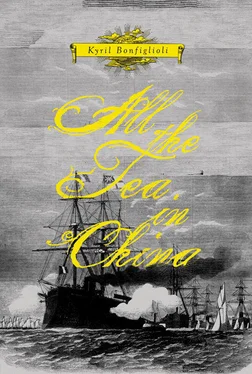Fate, however, was on the side of our top-men, for at noon, just as the Captain was chewing his beard in an agony of decision, the fellow at the mast-head holla’d the deck, crying a sail “fine on the port bow”. Captain Knatchbull instantly sent Peter Stevenage up the shrouds with the best spy-glass in the ship. For his part, he strolled to the starboard side, affecting to study the scend of the sea.
Two minutes later Peter was reporting: “Large Aden dhow, Sir; at about three miles. Only a scrap of sail on her and a bucket at the main-truck. Distress, Sir. No sign of life. No one at the helm, I fancy.”
“Thankyou, Mr Lord Stevenage; I am well acquainted with the meaning of a bucket at the main-truck in these waters. Pray tell the steersman to set a course to close with the, ah, distressed vessel and to heave to at one cable’s length from her.”
I followed Peter and intercepted him after he had delivered his orders.
“Why are you smiling, Peter?” I asked.
“Wait and see. And, oh, Karli, are your pistols primed, the charges dry and so forth?”
I looked at his grave face, decided that for once he was in deadly earnest, scuttled below and saw to my pistols. In a minute, one barker at each side of my belt, I sauntered on deck and joined the Captain in his scrutiny of the waves.
“Is it the plague, do you suppose, Sir?”
“They are the plague, Mr Van Cleef,” he answered tersely. I said no more, for his manner invited silence.
When we were hove-to every glass in the ship was trained upon the unlucky vessel. The only living being observable was a man in a turban and a gaudy, night-shirt-like robe, lashed to the mast and waving feebly to us.
“Gunner,” said the captain quietly, “can you put a ball through the mast?”
“I reckon I can that, Sir.”
“Then pray do so.”
“Aye aye, Sir.”
I gazed aghast as the gunner ambled towards the long brass Armstrong 68-pounder mounted on a pivot between the mast and bustled about it, testing the lock and handling the balls in the net until he chose one of perfect roundness. One of his mates came running up in list slippers (for he had been in the magazine, where a spark from a nailed shoe would send the whole ship to glory) carrying a stout cylindrical package. The gunner bit off a fragment of the cartridge-paper and poured some of the powder into the touch-hole. His mate rammed the rest into the barrel, then a wad, then the ball and another wad, thumping all well home.
“The ship’s company will wave,” said the captain. “Cheerily, now, lads!” Everyone waved in a cheery fashion to the poor wretch so near to salvation, except for me, who waved in a mystified way. The heathen waved back vigorously. The captain nodded to the gunner, who fussed a little more with his piece then snapped the lock.
When I could open my eyes again the heathen was no longer waving. This was because his head had vanished, you see. He was still tied to the stump but the rest of the mast was toppling, infinitely slowly, overside. I turned to the Captain: in my horror and agitation at his barbarous conduct I believe I was on the very point of rebuking him but, at that moment, a horrid clamour of raging screams came over the water and from behind the dhow there emerged two long boats, crammed with heathens, rowing frantically towards us. Those who were not rowing were brandishing curved swords which glistered in the sun.
“Only two boats, Sir,” said the First Mate laconically.
“Then I’ll have two guns run out, Mister,” grunted the Captain. “Fire at will. But destroy them before they come too close. I want no blood on my decks, you understand? See to it.”
The gunner was a master of his art, a master: his first shot from the carronade was a trifle high and only killed the heathen at the steering-oar but his next took her squarely in the bows and she opened out like a cabbage ready for stuffing — and, indeed, there was no want of minced meat to add kitchen-colour to the receipt. Our fellows on the gun-deck were less fortunate, or ill-trained, for their shots missed time and again so that the other boat, at which they were shooting, was soon so close that the guns would not depress low enough to bear.
“All gun crews to practise during their watches below for the next two days,” said the Captain in a disgusted voice. “Break out cold shot, if you please, Gunner.”
The next instant, it seemed, the shrieking horde were against our chains and grappling-hooks were flying — some lodged on our rail. Two of our men ambled forward nursing great cannon-balls and dropped them into the bottom of the boat. It was holed, filled and sunk in a moment but not before several of the Mahometan fiends were swarming up our side. One of our sturdy fellows sawed away at the grappling-lines with his great case-knife: he took a bullet from an ancient flintlock pistol in his shoulder but the lines were severed and the heathens fell screaming into the sea. Only one succeeded in boarding us; he rushed towards the Captain and me. There was a pistol in my hand. I aimed at his heart but my hand shook so that I shot him just above the private parts; he made an intolerable noise as he squirmed in the scuppers, voiding his bowels, his bladder and his blood most copiously. I had never killed a man before. I felt no distress, only a detached interest at how ignobly a brave man dies. I realised for the first time that Blanche was beside me, her lips parted, her eyes wide, her bosom heaving rapidly.
“Fined five shillings, Mr Van Cleef,” said the Captain crossly. “You heard me say I’d have no blood on my decks, did you not?”
I opened my mouth and shut it again. After all, I had saved his life, although I confess that my preoccupation had been more with my own.
“Go to your cabin, Blanche,” he went on. “Be ready in four and one half minutes.” He pulled out his watch.
A bored, disgusted seaman lifted my victim, still jerking and squealing, and hove him over the rail. I gazed down in horror, for the water was already boiling with sharks and other rapacious scavengers of the deep. Peter appeared beside me, put his hand on my shoulder.
“Karli, if you ever go overside in Tropic waters, pray for a shark, do. They are quick, you see. The barracoutha takes his time, goes for the titbits first, if you take my meaning. A fellow might live for half an hour with a barracoutha at him. Now, I’ve just to see the guns swabbed and secured then I’ll join you for dinner. Fish chowder today, you are fond of fish I believe?”
I think he was trying to hearten me. I forget what I said to him.
As we traversed the Indian Ocean the breezes became ever more warm and spiced. The doctor’s dishes, too, became hotter and spicier as he weaned me, not unwillingly, onto such fare. Those karis, pilaffs and tarkeeans, you see, not only disguise the odour of meat which is past its youth, they also provoke the jaded appetite in the long, languorous days and induce a wholesome, cooling sweat. How different they were from the gross Dutch food of my childhood, yet how I learned to love them! The Doctor, it was evident, grew to love me for my appreciation of his victuals and Orace was kept busy running from the galley to our cabin, carrying each day new and more bizarre confections. Peter Stevenage had a poor appetite, ruined by liquor and the pox, I suppose, but he never ceased to marvel at my adroitness with the knife and fork. He often remarked, as he passed me his scarcely-touched plate, that to watch me at the trencher was as good as a feast. I am sure that he meant this in sincerity and kindness, for there was no malice in his whole body.
Blanche, too, became warmer and spicier in the sultry air; her clothing — I observed her narrowly — was now little more than a muslin gown no less explicit than a shift. She no longer bridled when I called her “Blanche” and sometimes, when we leaned on the rail together enjoying the first cool wafts of the tropic dusk, her naked arm would rest warmly against mine and once or twice, even, I would relish the incandescence of her flank through my cotton trowsers.
Читать дальше












